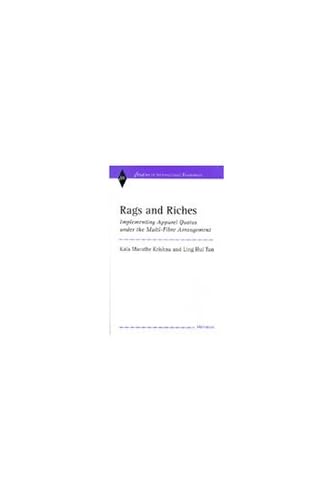Items related to Rags and Riches: Implementing Apparel Quotas under...
Rags and Riches: Implementing Apparel Quotas under the Multi-Fibre Arrangement (Studies In International Economics) - Hardcover

The authors endeavor to fill several gaps in the literature on the MFA. First, they more closely examine the various quota implementation rules and their implications by describing how the details of quota implementation differ across countries, modeling some aspects of implementation, and attempting to relate some of the results to actual data. Second, by considering alternative theoretical setups and undertaking some simple econometric tests, they look into the possibility that exporting countries may be receiving less quota rent than suggested by the standard competitive model. A selected number of exporters to the United States--including Hong Kong, Korea, Indonesia, India, and Mexico--serve as case studies.
Kala Krishna and Ling Hui Tan conclude that the process of quota implementation begins with an initial system of regulations, drawn up in order to meet certain desirable objectives. But over time, as loopholes are discovered in the system, additional layers of regulation continue to be introduced, resulting in a complicated, discretionary system that no longer meets the original objectives.
Kala Krishna is Professor of Economics, Pennsylvania State University. Ling Hui Tan is an Economist, International Monetary Fund.
"synopsis" may belong to another edition of this title.
- PublisherThe University of Michigan Press
- Publication date1998
- ISBN 10 0472109340
- ISBN 13 9780472109340
- BindingHardcover
- Number of pages255
Buy New
Learn more about this copy
Shipping:
US$ 3.99
Within U.S.A.
Top Search Results from the AbeBooks Marketplace
Rags and Riches Format: Hardcover
Book Description Condition: New. Brand New. Seller Inventory # 0472109340
Rags and Riches (Hardcover)
Book Description Hardcover. Condition: new. Hardcover. The Multi-Fibre Arrangement (MFA) is among the most important nontariff trade barriers facing developing countries today. Originating more than twenty years ago, it uses product-specific quotas intended to encourage the expansion of trade, reduce barriers, and further the liberalization of world trade in textile products. It has been argued, however, that the MFA may cut off access to major export markets for developing countries, thereby short-circuiting their industrialization process at an early stage. The authors endeavor to fill several gaps in the literature on the MFA. First, they more closely examine the various quota implementation rules and their implications by describing how the details of quota implementation differ across countries, modeling some aspects of implementation, and attempting to relate some of the results to actual data. Second, by considering alternative theoretical setups and undertaking some simple econometric tests, they look into the possibility that exporting countries may be receiving less quota rent than suggested by the standard competitive model. A selected number of exporters to the United States--including Hong Kong, Korea, Indonesia, India, and Mexico--serve as case studies. Kala Krishna and Ling Hui Tan conclude that the process of quota implementation begins with an initial system of regulations, drawn up in order to meet certain desirable objectives. But over time, as loopholes are discovered in the system, additional layers of regulation continue to be introduced, resulting in a complicated, discretionary system that no longer meets the original objectives. Kala Krishna is Professor of Economics, Pennsylvania State University. Ling Hui Tan is an Economist, International Monetary Fund. The Multi-Fibre Arrangement (MFA) is among the most important nontariff trade barriers facing developing countries today. Here the authors endeavor to fill several gaps in the literature on the MFA. Citing specific examples, they demonstrate how quota implementation begins with an initial regulatory system that becomes increasingly complex and discretionary as rules are changed and new ones added. Shipping may be from our UK warehouse or from our Australian or US warehouses, depending on stock availability. Seller Inventory # 9780472109340

